|
|
|
Sort Order |
|
|
|
Items / Page
|
|
|
|
|
|
|
| Srl | Item |
| 1 |
ID:
161328
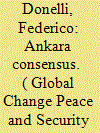

|
|
|
|
|
| Summary/Abstract |
Although research has examined the Turkish agenda for Africa since 2002, few studies have considered Turkey's uniqueness compared to other extra-regional actors. This study is an attempt to analyze and conceptualize the characteristics, benefits, challenges, and limits of Turkey's policy toward the region. This article argues that the characteristics of the Turkish agenda toward sub-Saharan Africa have made Turkey a non-traditional actor in the region, following a novel paradigm of sustainability development: the Ankara consensus. The effects of this model will continue to shape the decisions, policies, and perceptions of the Turkish political elite vis-à-vis Africa and, by extension, the Global South for the foreseeable future.
|
|
|
|
|
|
|
|
|
|
|
|
|
|
|
|
| 2 |
ID:
161329
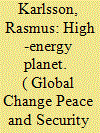

|
|
|
|
|
| Summary/Abstract |
A key part of the ecomodern discourse of a ‘Good Anthropocene’ is the vision of a ‘high-energy planet’ characterized by universal access to modern energy. Recognizing the crucial historical role that rising energy consumption has played in driving social transformations, ecomodernists imagine a future with substantial global equality of opportunity powered by clean and abundant energy. Whereas traditional environmental thinking has advocated land-intensive distributed forms of renewable energy, ecomodernists have argued that such technologies are fundamentally incompatible with a world in which 7–10 billion people can live modern lives. Instead, ecomodernists believe that only breakthrough innovation can overcome the current political and cultural polarization surrounding climate change and provide a unifying pathway towards climate stability. Yet, resurging populism and nationalism, but also the statist frame of the United Nations Framework Convention on Climate Change process, make such a future unlikely as rich countries remain focused on meeting their own domestic emissions targets rather than decarbonizing the global economy as a whole. As a consequence, overall political polarization is bound to increase as radical environmental voices will call for ever harsher demand-side reductions while technocratic elites may come to see solar radiation management as the only feasible way of preventing an irreversible destabilization of the climate system.
|
|
|
|
|
|
|
|
|
|
|
|
|
|
|
|
| 3 |
ID:
161325
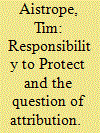

|
|
|
|
|
| Summary/Abstract |
This article explores the problem of attribution in the context of Responsibility to Protect (R2P) intervention through an analysis of the Syrian chemical weapons attack of 2013. We argue that R2P advocates can be confronted by a crisis dynamic where the political momentum for military intervention runs ahead of independent verification and attribution of mass atrocity crimes. We contrast the political momentum for intervention with the technical process of independent attribution and show that the sort of independent evidence that would ideally legitimize an R2P intervention was unavailable when there was political momentum for action. Conversely, the information that was available (which inevitably informed the political momentum for action) was largely produced by state intelligence organizations – or a potentially briefed media – and shaped by the interests and priorities of its end users. While understandable in the face of the ‘extreme’, we suggest that the mobilization of political momentum by R2P advocates entails significant dangers: first, it risks undermining the integrity of R2P if evidence is later discredited and second, it risks amplifying the perception that states sometimes exploit humanitarian pretexts in pursuit of other strategic ends.
|
|
|
|
|
|
|
|
|
|
|
|
|
|
|
|
| 4 |
ID:
161327
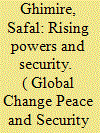

|
|
|
|
|
| Summary/Abstract |
Interactions of rising powers and established powers and their implications in peacebuilding and security remain underexplored in existing literature. This paper aims to explore inferences of the behaviour of Brazil, China and India in peacebuilding and security, their contention and cooperation with the US and European powers, and implications for the global south. It analyses their interactions in the light of democratic peace propositions, adhered to by established powers, and the regional security complex theory pertinent to the ascendancy of new powers. Though liberal countries are co-opting emerging actors, the responses of rising powers to international security issues appear inconsistent and unpredictable. With increasing material capabilities, rising powers have been creating a patron–client relationship with conflict-affected states, because of which this article disconfirms possibilities of a sometimes anticipated pro-south world order.
|
|
|
|
|
|
|
|
|
|
|
|
|
|
|
|
| 5 |
ID:
161326
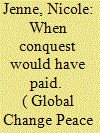

|
|
|
|
|
| Summary/Abstract |
In recent decades, a lack of state capacity has been seen as a major threat to international security. This article disagrees by making a simple claim: states that lack the capacity to go to war compromise to avoid it. I develop the argument using insights from the discipline of International Relations and military studies and probe its plausibility with a single case study, the Thai-Cambodian border conflict during 2008–2011. Based on data from field research in the two countries, I use Peter Liberman's framework to argue that this is a case when conquest would have paid for Thailand. Yet, a lack of domestic capacity created trade-offs, fear of instability and reduced confidence in a military strategy, which together explain why large-scale armed conflict was avoided by both sides. The findings have potential implications for how we think about international security today.
|
|
|
|
|
|
|
|
|
|
|
|
|
|
|
|
|
|
|
|
|